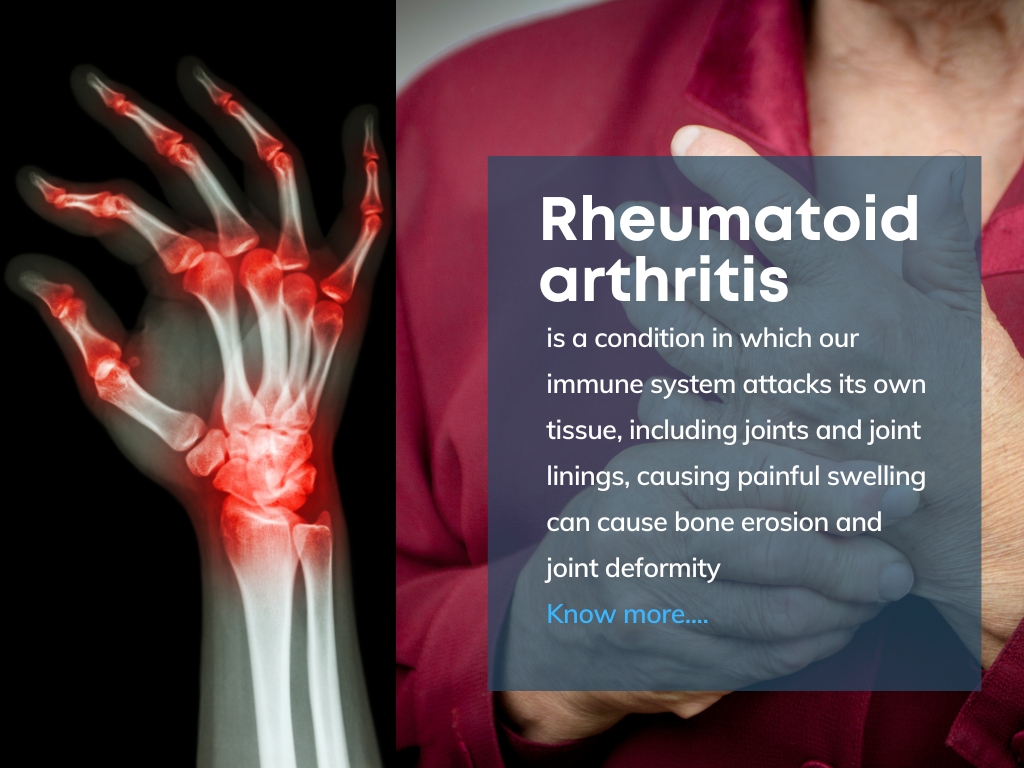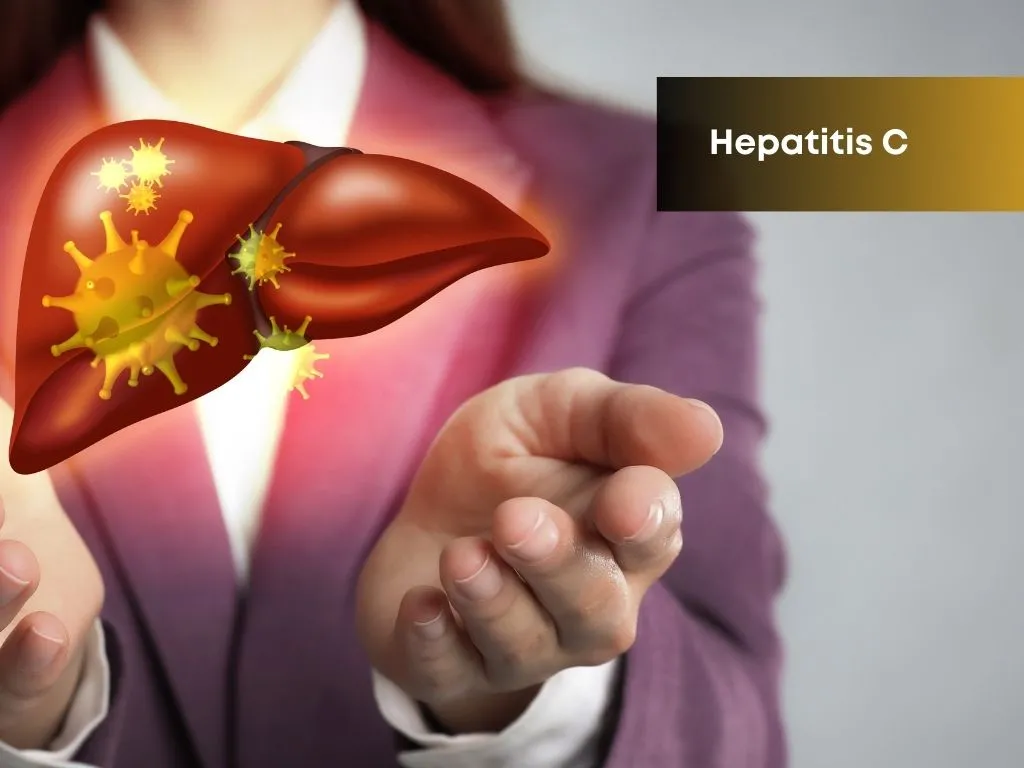Overview
Rheumatoid arthritis (RA) is a chronic autoimmune disorder that primarily affects the joints, causing inflammation, pain, stiffness, and swelling. Unlike osteoarthritis, which typically results from wear and tear on the joints over time, rheumatoid arthritis occurs when the immune system mistakenly attacks the synovium, the lining of the membranes that surround the joints. This leads to inflammation, which can eventually damage the cartilage and bone within the joint.
Causes
Genetic : There is evidence to suggest that certain genetic factors increase the risk of developing rheumatoid arthritis. Individuals with a family history of RA are more likely to develop the condition themselves.Environmental triggers: Environmental factors, such as infections or exposure to certain substances, may trigger an abnormal immune response in genetically susceptible individuals, leading to the development of rheumatoid arthritis. Smoking, in particular, has been identified as a significant environmental risk factor for RA.Hormonal factors: Hormonal changes, such as those that occur during pregnancy or menopause, may influence the onset or severity of rheumatoid arthritis. Women are more likely to develop RA than men, and the disease often improves during pregnancy but may worsen after childbirth.Immune system dysfunction: In rheumatoid arthritis, the immune system mistakenly identifies components of the synovium as foreign invaders and launches an immune response against them. This results in inflammation, which can lead to joint damage over time.
Symptoms
Joint pain: Persistent pain, typically affecting multiple joints, is a hallmark symptom of RA. The pain may be present at rest or worsen with movement.Joint stiffness: Stiffness in the joints, particularly in the morning or after periods of inactivity, is another characteristic symptom of RA. This stiffness may last for hours and gradually improve with movement.Joint swelling and tenderness: Inflammation of the synovium (the lining of the joint) can cause swelling, warmth, and tenderness in the affected joints.Reduced range of motion: RA can lead to a decrease in the range of motion of affected joints, making it difficult to perform daily activities.Fatigue: Many individuals with RA experience persistent fatigue, which may be related to the underlying inflammation and the body's immune response.Fever and other systemic symptoms: Some people with RA may develop a low-grade fever, along with other systemic symptoms such as weight loss, decreased appetite, and generalized weakness.Joint deformities: Over time, chronic inflammation in RA can lead to joint damage and deformities, such as misalignment or deformity of the fingers, wrists, and toes.Rheumatoid nodules: These firm lumps of tissue may develop under the skin, typically over pressure points or near affected joints.
Treatment: Modern Medicine
Pharmacological Therapies:
Disease-modifying antirheumatic drugs (DMARDs): The mainstay of treatment, slowing disease progression and protecting joints. Examples include Methotrexate, Leflunomide, and Sulfasalazine.Nonsteroidal anti-inflammatory drugs (NSAIDs): Provide pain relief and reduce inflammation, but do not slow disease progression. Examples include Ibuprofen and Naproxen.Corticosteroids: These powerful anti-inflammatory medications may be used to quickly reduce inflammation and relieve pain, particularly during flare-ups. Examples include Prednisone and Methyl prednisolone. However, they are typically used for short-term management due to potential side effects with long-term use.Surgery: In severe cases of RA where joint damage is significant and other treatments have been ineffective, surgery may be necessary to repair or replace damaged joints.
Treatment: Traditional Medicine
Hot and cold therapy: Applying heat packs or cold packs to affected joints can help reduce pain and inflammation. Warm baths or showers may also help relax muscles and ease stiffness.Dietary supplements: Some people with RA find relief from symptoms by taking dietary supplements such as omega-3 fatty acids, turmeric, ginger, and vitamin D. However, evidence supporting the effectiveness of these supplements in RA is limited, and individuals should speak with their healthcare provider before starting any new supplements.Herbal remedies: Certain herbs and botanical extracts, such as Boswellia serrata, Devil's claw, and Thunder god vine, have been used in traditional medicine to relieve inflammation and pain associated with arthritis.
Caution
Be wary of unproven remedies: While some traditional and home remedies may provide relief for RA symptoms, many lack scientific evidence to support their effectiveness. It's essential to critically evaluate the evidence and approach unproven remedies with caution. If a remedy sounds too good to be true or promises miraculous results, it's wise to be skeptical and seek advice from trusted healthcare professionals.Monitor for adverse effects: Even natural remedies can have side effects or interactions with medications. Keep an eye out for any adverse effects or changes in symptoms after trying a new remedy, and report them to your healthcare provider promptly. They can help determine whether the remedy is safe and appropriate for you.Stick with reputable sources: When researching traditional and home remedies, rely on reputable sources of information such as healthcare professionals, medical organizations, and peer-reviewed research studies. Be cautious of anecdotal evidence or information from unreliable sources, as it may be misleading or inaccurate.
Prevention
Exercise: Regular physical activity, including stretching, strength training, and low-impact aerobic exercises like swimming or walking, can help improve joint function, reduce stiffness, and increase mobility. It's essential to consult with a healthcare provider or physical therapist to develop an exercise program tailored to individual needs and abilities.Weight management: Maintaining a healthy weight can help reduce strain on joints and alleviate symptoms of RA. A balanced diet and regular exercise can contribute to weight management and overall health.Rest and relaxation: Getting adequate rest and practicing relaxation techniques can help reduce stress, improve sleep quality, and alleviate symptoms of RA. It's essential to listen to your body and pace yourself, balancing activity with rest as needed.Mind-body therapies: Practices such as yoga, tai chi, meditation, and deep breathing exercises may help reduce stress, improve relaxation, and promote overall well-being in individuals with RA.
 Nalamaree Team
Nalamaree Team





















.jpg.webp)
